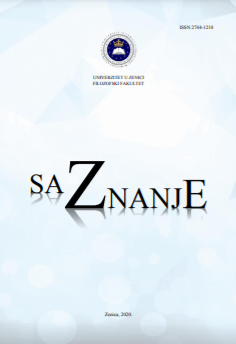MEHRDEUTIGKEIT VON KOPULAVERBEN IN DER DEUTSCHEN UND IHRE ÄQUIVALENTE IN DER BOSNISCHEN SPRACHE
AMBIGUITY OF COPULAR VERBS IN GERMAN AND THEIR EQUIVALENTS IN BOSNIAN LANGUAGE
Author(s): Memnuna Hasanica, Almina Lisičić-HedžićSubject(s): Language studies, Lexis, Semantics, South Slavic Languages
Published by: Filozofski fakultet, Univerzitet u Zenici
Keywords: Copula; copular verbs; predicate; semi-copular verbs;
Summary/Abstract: The term copular verb (lat. copulare = to connect, to link) is usually used for a small group of verbs frequently used in oral and written communication. They are syntactically and semantically different from the lexical verbs, standalone verbs in a sentence, as well as from the modal verbs. There are verbs sein, werden and bleiben, such as verbs scheinen, dünken und heißen. Copula is a functional category without meaning, that links the subject to a non-verbal part of the predicate, which is necessary to convey the meaning of the sentence. In such role, there can be a noun (She was a cook. = Sie war Köchin.), adjective (He is wise. = Er ist klug.), adverb (Sie ist wieder hier. = She is here again.), noun phrase in genitive case (She is of short height. = Sie ist geringen Wachstums.). Such sentences require copula in order for the aforementioned category to be able to function as a predicate. Those sentences are referred to as copula sentences/Kopulasätze. Grammars or Bosnian, Croatian, Serbian Language list the division into copular verbs (verb to be) and semi-copular verbs different from the verb to be thanks to, besides grammatical, they also have (incomplete) lexical meaning. Semi-copular verbs can be intransitive (become, stay, look) and transitive (consider, name, declare). The paper deals with the ambiguity of the copular verbs as well as with the complements of these verbs. These complements are most frequently nouns or adjectives, syntactically classified as predicatives.
Journal: saZnanje
- Issue Year: 2/2020
- Issue No: 2
- Page Range: 133-146
- Page Count: 14
- Language: German

